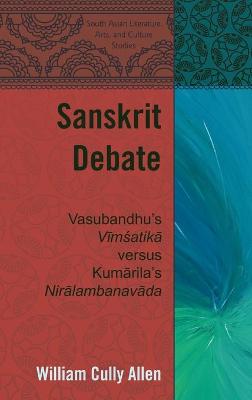Sanskrit Debate: Vasubandhu's 'Vimsatika' versus Kumarila's 'Niralambanavada' illustrates the rules and regulations of classical Indian debate literature (pramanasastra) by introducing new translations of two Sanskrit texts composed in antithesis to each other's tradition of thought and practice. In the third century CE, Vasubandhu, a Buddhist philosopher-monk, proposed that the entire world of lived experience is a matter of mind only through his Vimsatika (Twenty Verses). In the seventh century CE, Kumarila, a Hindu philosopher-priest, composed Niralambanavada (Non-Sensory Limit Debate) to establish the objective reality of objects by refuting Vasubandhu's claim that objects experienced in waking life are not different from objects experienced in dreams. Kumarila rigorously employs formal rules and regulations of Indian logic and debate to demonstrate that Vasubandhu's assertion is totally irrational and incoherent.
Vimsatika ranks among the world's most misunderstood texts but Kumarila's historic refutation allows Vimsatika to be read in its own text-historical context. This compelling, radically revolutionary re-reading of Vimsatika delineates a hermeneutic of humor indispensable to discerning its medicinal message. In Vimsatika, Vasubandhu employs the form of professional Sanskrit logic and debate as a guise and a ruse to ridicule the entire enterprise of Indian philosophy. Vasubandhu critiques all Indian theories of epistemology and ontology and claims that both how we know and what we know are acts of the imagination.
- ISBN13 9781433117589
- Publish Date 30 December 2014 (first published 1 January 2014)
- Publish Status Active
- Publish Country US
- Imprint Peter Lang Publishing Inc
- Edition New edition
- Format Hardcover
- Pages 138
- Language English
- URL https://peterlang.com/view/product/29661?format=HC
